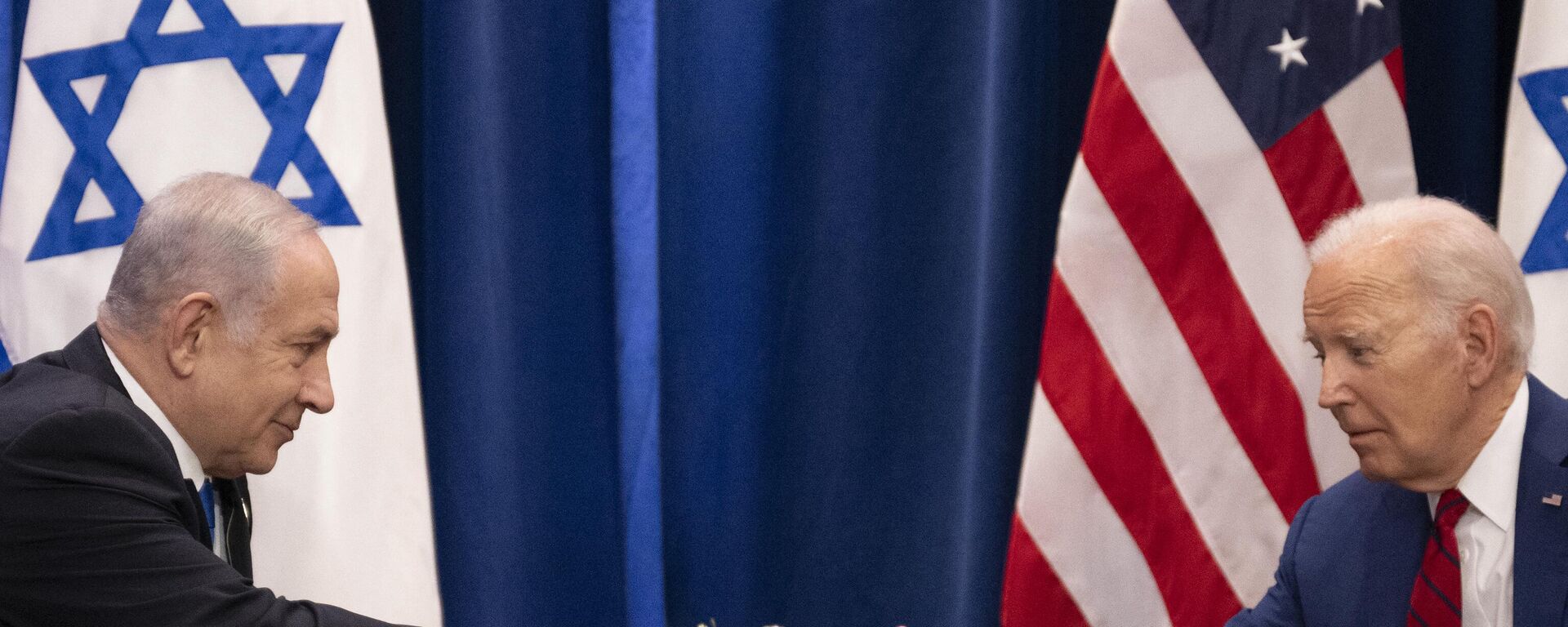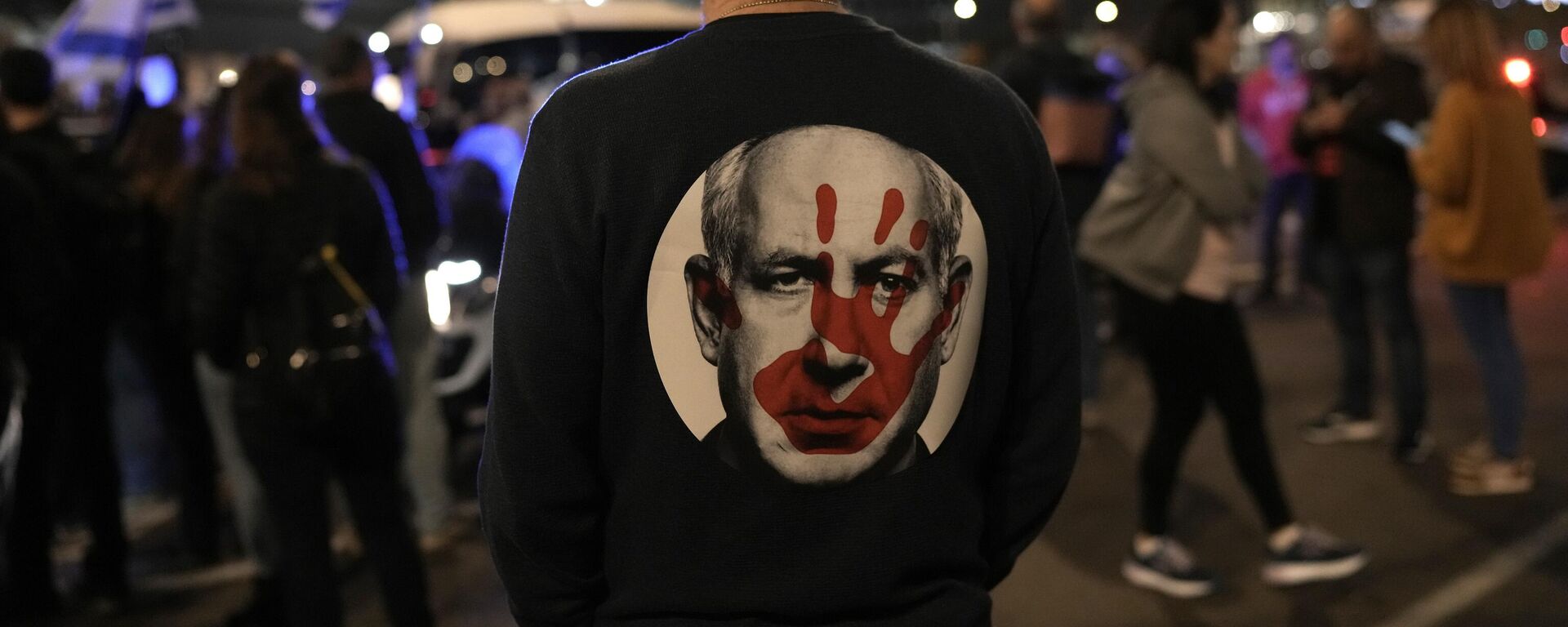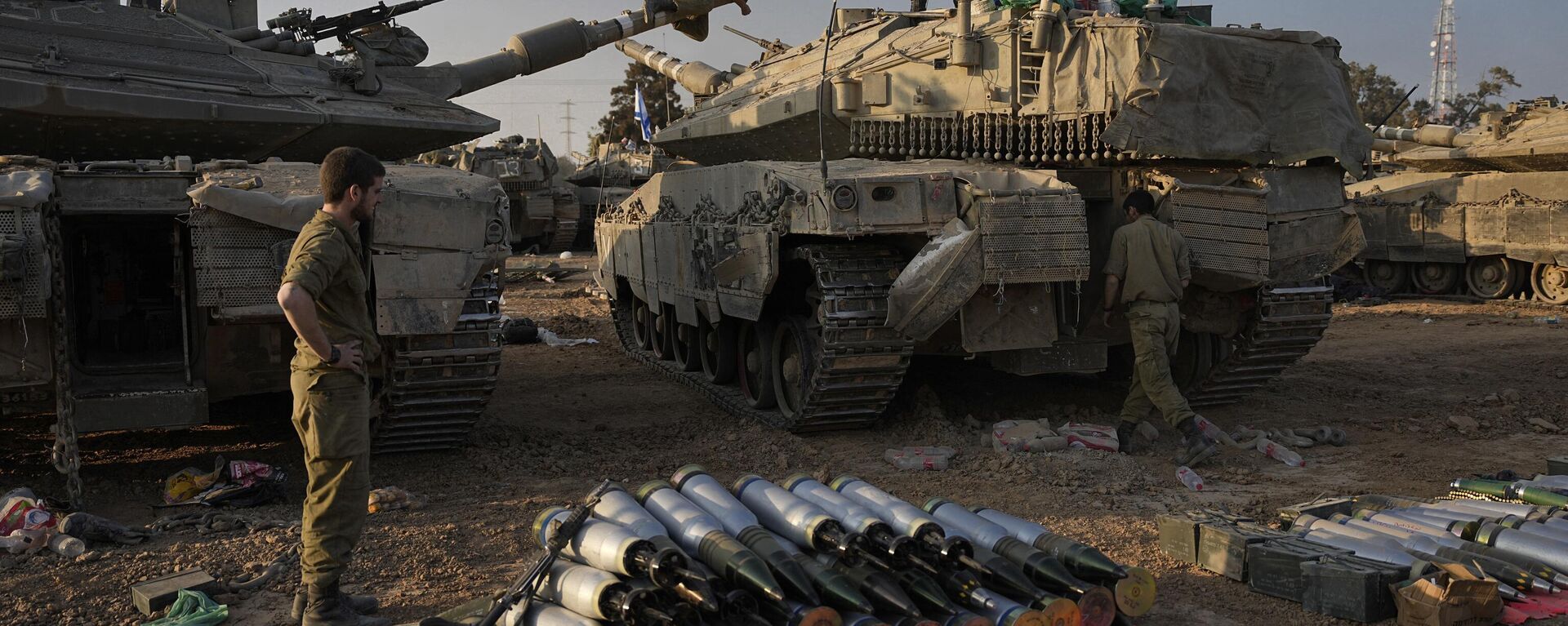With Walls Closing In Around Him, Netanyahu May Start ‘Even Larger Regional War’
18:54 GMT 30.04.2024 (Updated: 04:44 GMT 01.05.2024)

© AFP 2023 / LEO CORREA
Subscribe
Israeli officials and US lawmakers are preparing for the fallout of an ICC move to issue arrest warrants against Israel’s prime minister and his inner circle over the way Israel has prosecuted the Gaza war. Tel Aviv-based international affairs expert Simon Tsipis explains why the situation dramatically escalates the risks of a regional conflict.
Prime Minister Benjamin Netanyahu warned on Tuesday that an International Criminal Court decision to issue arrest warrants against himself and other Israeli officials over alleged war crimes in Gaza would be a “scandal on a historic scale.”
“I want to make one thing clear: no decision, neither in The Hague nor anywhere else, will harm our determination to achieve all the goals of the war – the release of all our hostages, a complete victory over Hamas and a promise that Gaza will no longer pose a threat to Israel,” Netanyahu said in a video address.
Israel is not a party to the ICC’s Rome Statute and does not recognize the Brussels-based court’s jurisdiction. However, Palestine is a member of the ICC, joining in 2015, and its jurisdiction includes Gaza, the West Bank and East Jerusalem. The United States quit the Court in 2002 before launching its war of aggression against Iraq. The Trump administration slapped sanctions on ICC officials in 2020 after the court opened a probe into possible US war crimes in Afghanistan. The Biden administration lifted the sanctions in April 2021, with ICC Prosecutor Karim Khan subsequently dropping the US military and the CIA from its Afghan war crimes inquiry in late 2021.
A group of lawmakers in the US Congress are reportedly drafting legislation to ‘retaliate’ against the ICC with new sanctions if it goes ahead with arrest warrants against senior Israeli officials. Earlier, Israeli media reported that Netanyahu had appealed to President Biden personally to try to block the potential arrest warrants.
Netanyahu Between a Rock and a Hard Place
The Hague’s arrest warrant threat, combined with reported US plans to sanction a radical Zionist IDF battalion (which have apparently been shelved for now), constitute a “low quality,” barely concealed effort by Western powers to pressure Netanyahu into making a deal with Hamas to end the war in Gaza, and ultimately, to agree to the creation of a Palestinian state, says Dr. Simon Tsipis.
“A deal with Hamas would mean Israel’s defeat in the war with Hamas, and the cancellation of the operation in Raffah, and an uprising of the right-wing camp against Netanyahu, the exit of right-wing politicians and ministers from the government, its collapse, and new elections. Such a chain reaction, such a domino effect would transpire if he makes a deal with Hamas,” Tsipis told Sputnik.
If Netanyahu doesn’t make a deal, Washington will move forward with the sanctioning of the IDF unit, the ICC will go ahead with its arrest warrants, the military operation will likely begin in Raffah, and Israel will face internal uprisings from the political left flank, including “more violent demonstrations, and demands for Netanyahu to resign,” the observer said.
That puts Netanyahu in a “very difficult, one might say hopeless situation,” Tsipis stressed, warning that “whatever he does, it will mean a big crisis inside Israel and abroad.”
“In this context, the situation becomes even more dangerous, since his only chance to survive politically in this fight and under this pressure is to unleash an even larger regional war. This cannot be ruled out, since Israeli provocations toward Iran under Netanyahu’s leadership are continuing. It’s quite possible that a third outcome in this situation may occur: provocations against Iran and the beginning of a large-scale regional war with Iran. This is the only thing that can save Netanyahu, allow him to remain in power, escape responsibility and prevent the collapse of the government. Therefore, the situation is extremely difficult, with everything basically depending on this one person,” the observer noted.
Tsipis believes that like Netanyahu, Hamas may also be disinterested in making a deal to end the Gaza crisis, since Israeli agreement to the creation of a Palestinian state could threaten its own positions.
Meanwhile, if the ICC moves forward with warrants against the Israeli leadership, it would threaten not only Netanyahu, but Israel’s position in the world.
“If an arrest warrant [against Netanyahu, ed.] is issued, it will serve as a tailwind for anti-Israeli protests. They will increase, and they will likely take a more violent form not only in the US, but throughout the world, because if the ICC makes good on its threats, it will be a sign of legitimacy for the protests. Right now, these protests are considered illegitimate” by most of the governments where they are taking place. “But if the ICC decides that yes, there were violations of human rights, that yes, an arrest warrant needs to be issued, it will result in even greater tensions and an even greater wave of anti-Israeli protests,” Dr. Tsipis explained.
Lobbying Power
As for US politicians’ lobbying on Israel’s behalf with plans to pressure the White House into stopping the ICC from moving forward, the academic believes these efforts come down to the existence of a “very powerful” Israeli lobby in the American political establishment.
“Actually, most politicians in the current administration are tied, very tightly tied, to the Jewish lobby, and the Jewish lobby has a number of leavers to pressure US politicians. Therefore, I would say that for the United States, for President Biden, concern for Americans and for America and concern for Israel are roughly equal. Israel has such powerful ability to pressure and influence the United States that, in fact, American leaders worry about Israel as they would about Americans,” Dr. Tsipis said.




